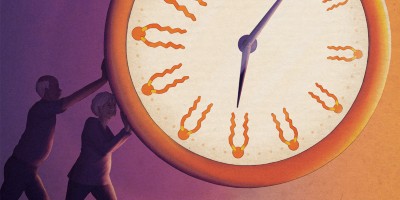Under conditions of stress, autophagic degradation of nuclear and nucleolar components was found to promot.e youthfulness and delay aging by preserving nuclear architecture and preventing nucleolar expansion, in somatic cells. We also found that nuclear-material autophagy serves as an essential quality-control mechanism that contributes to sustaining germline immortally.

References
Scaffidi, P. & Misteli, T. Reversal of the cellular phenotype in the premature aging disease Hutchinson–Gilford progeria syndrome. Nat. Med. 11, 440–445 (2005). This paper reports that cellular defects associated with Hutchinson–Gilford progeria syndrome are rescued by eliminating mutant lamin A in patient fibroblasts.
Lans, H. & Hoeijmakers, J. H. Ageing nucleus gets out of shape. Nature 440, 32–34 (2006). A commentary article that surveys studies linking normal and premature aging with nuclear architecture integrity and genome stability.
Buchwalter, A. & Hetzer, M. W. Nucleolar expansion and elevated protein translation in premature aging. Nat. Commun. 8, 328 (2017). This paper reports the expansion of nucleoli and increased protein synthesis in patients with Hutchinson–Gilford progeria syndrome, as well as during aging in healthy humans.
Tiku, V. et al. Small nucleoli are a cellular hallmark of longevity. Nat Commun. 8, 16083 (2017). This paper reports that nucleolar size is a cellular hallmark that is highly predictive of longevity in the nematode C. elegans.
Lee, C. W. et al. Selective autophagy degrades nuclear pore complexes. Nat. Cell Biol. 22, 159–166 (2020). This paper reports the autophagic degradation of nucleoporins, upon nitrogen starvation or perturbation of nuclear pore complex architecture, in the yeast Saccharomyces cerevisiae.
Additional information
Publisher’s note Springer Nature remains neutral with regard to jurisdictional claims in published maps and institutional affiliations.
This is a summary of: Papandreou, M.-E., Konstantinidis, G. & Tavernarakis, N. Nucleophagy delays aging and preserves germline immortality. Nat. Aging https://doi.org/10.1038/s43587-022-00327-4 (2022).
Rights and permissions
About this article
Cite this article
Nuclear autophagy promotes longevity and germline immortality. Nat Aging 3, 11–12 (2023). https://doi.org/10.1038/s43587-022-00336-3
Published:
Issue Date:
DOI: https://doi.org/10.1038/s43587-022-00336-3
- Springer Nature America, Inc.


